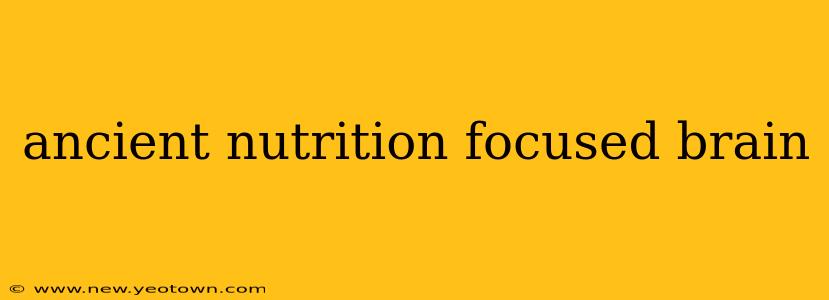For centuries, cultures across the globe have sought ways to enhance brain function and protect against cognitive decline. Ancient traditions offer a treasure trove of wisdom regarding nutrition and brain health, often relying on whole foods and natural remedies long before modern science delved into the intricacies of neurobiology. This exploration delves into the ancient approaches to brain nutrition and how their principles continue to inform modern perspectives on cognitive wellness.
What are the ancient secrets to a healthy brain?
This question lies at the heart of understanding ancient nutrition's impact on brain health. Many ancient civilizations emphasized a diet rich in whole, unprocessed foods, believing that the body's ability to function optimally, including the brain, depended on nutrient-dense sustenance. These foods were often sourced locally and seasonally, ensuring maximum freshness and bioavailability of nutrients. Think vibrant fruits, leafy green vegetables, nuts, seeds, legumes, and lean protein sources – all crucial for providing the building blocks for healthy brain cells and neurotransmitters.
Beyond specific foods, the ancient world also valued practices that supported overall well-being, recognizing the interconnectedness of physical and mental health. Adequate sleep, regular physical activity, mindfulness practices (like meditation), and stress reduction techniques were all integral components of maintaining sharp cognitive function.
What foods did ancient cultures eat to support brain health?
Ancient diets varied greatly depending on geographical location and available resources, but common threads emerge regarding brain-boosting foods. The Mediterranean diet, for example, which has roots in ancient Greece and Rome, is rich in olive oil, fruits, vegetables, fish, and whole grains – all linked to improved cognitive function. Similarly, traditional Asian diets, incorporating ingredients like ginseng, turmeric, and various types of mushrooms, have long been associated with brain health benefits. These foods are brimming with antioxidants, polyphenols, and other bioactive compounds that protect brain cells from damage and support healthy cognitive processes.
Specific examples include:
- Fatty Fish (Salmon, Mackerel): Rich in Omega-3 fatty acids, crucial for brain structure and function.
- Berries (Blueberries, Strawberries): Packed with antioxidants that combat oxidative stress, a major contributor to age-related cognitive decline.
- Leafy Greens (Spinach, Kale): Excellent sources of vitamins K, C, and folate, vital for brain health.
- Nuts and Seeds (Walnuts, Flaxseeds): Provide healthy fats, antioxidants, and various micronutrients.
How did ancient cultures prevent cognitive decline?
Preventing cognitive decline wasn't just about diet; it was a holistic approach. Ancient cultures emphasized a lifestyle that nurtured both physical and mental well-being. Regular physical activity was commonplace, often integrated into daily life through tasks like farming and walking. This physical exertion was considered essential for improving blood flow to the brain and promoting cognitive sharpness.
Furthermore, practices fostering mental agility and emotional balance played a significant role. Many cultures embraced activities like storytelling, music, and engaging in stimulating conversations – all effective ways to exercise the brain and keep it sharp. Mindfulness practices, though not always explicitly named as such, were interwoven into daily life, contributing to stress reduction and mental clarity.
What are some modern interpretations of ancient brain nutrition?
Modern neuroscience has validated many of the principles embedded in ancient approaches to brain health. Today, we understand the crucial role of specific nutrients in brain function, and many of the foods favored in ancient diets are now recognized as "brain foods." However, modern interpretations often involve a more nuanced understanding of individual needs and potential interactions between different nutrients.
Modern dietary recommendations for brain health often incorporate the core principles of ancient wisdom:
- Emphasis on whole, unprocessed foods: Minimize processed foods, added sugars, and unhealthy fats.
- Abundance of fruits, vegetables, and whole grains: Ensure a diverse range of micronutrients.
- Regular consumption of fatty fish: For the essential Omega-3 fatty acids.
- Incorporation of antioxidants: From berries, nuts, seeds, and spices.
- Lifestyle choices promoting brain health: Regular exercise, adequate sleep, stress management, and cognitive stimulation.
By understanding and integrating the wisdom of ancient cultures with the knowledge of modern science, we can craft a holistic approach to brain nutrition that supports cognitive health throughout life. The journey to a healthy brain begins with a balanced diet, an active lifestyle, and a mindful approach to living.

